Public Services in the Crosshairs The impacts of investment protection regimes on the public services sector in Latin America and the Caribbean
This report shows how Bilateral Investment Treaties (BITs) endanger public services in Latin America and the Caribbean (LAC) by mapping sector-related claims brought by foreign investors. It is intended to foster debate on how to break free from the investment protection system by presenting examples of countries in LAC and beyond have reviewed their BITs.
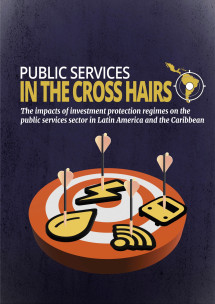
Downloads
About public services in the crosshairs
- Publication type
- Report
Authors
Authors
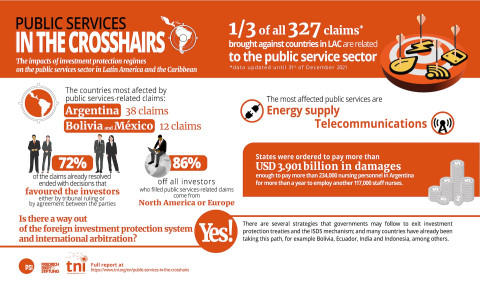
Introduction
During the 1990s, the countries of Latin America and the Caribbean (LAC) signed hundreds of international treaties safeguarding foreign investment and granting foreign investors unprecedented rights. These include the right of investors to sue states in international courts when investors consider their profits to have been affected in some way by government actions. LAC countries expected that, by signing these investment protection agreements (known as Bilateral Investment Treaties, or BITs), they would boost foreign direct investment. Yet 30 years later, evidence shows that BITs have been anything but an instrument that contributes to attracting investment, much less of promoting development; on the contrary, these treaties have had harmful effects on the countries in the region.
At present, LAC is the world’s second region in terms of the number of claims brought against various countries before arbitral tribunals on the basis of BITs. These claims, however, are not adjudicated in national judicial systems, because BITs grant investors the power to bring claims before international tribunals through Investor-State Dispute Settlement (ISDS) mechanisms. This has produced a parallel justice system,1 whereby investors circumvent national courts and go directly to private tribunals that often favour claimants over the states being sued.
The Investor-State Dispute Settlement mechanism, known as ISDS, allows foreign investors, mostly large transnational corporations (TNCs) and investment funds, to bring claims against states before international arbitral tribunals when they find that laws, regulations, court rulings, and other measures taken by a given state violate the safeguards they have under a treaty. There is no obligation to exhaust national legal remedies.
ISDS is a one-way mechanism, as only investors are allowed to file a case with an international arbitral court, not the states. This is so because these claims are based on clauses established in BITs, investment protection treaties centred on the investor’s legal rights, rather than on human, labour, or environmental rights.
Cases brought before arbitral tribunals are usually decided by three arbitrators, often lawyers working for the private sector and heavily biased in favour of investors. ISDS has been subject to widespread criticism from scholars, professionals, and civil society for, among other reasons:
-
Lack of transparency in arbitral procedures.
-
Absence of impartiality and independence by arbitrators.
-
Higher cost of investment–state arbitration costs over rulings by national courts.
-
Victims of abuses by TNCs have no similar mechanism to bring their claims before justice.
By the end of 2001, 327 ISDS claims were known to have been made against countries in the LAC region. Nearly two thirds of the 206 claims resolved favoured investors, either awarded by an arbitral tribunal or by agreement between the parties. The states were ordered to disburse USD 33.638 billion.2 It was estimated by the United Nations that just a third of that amount (USD 10.667 billion) would be enough to overcome the extreme poverty of 16 Latin American countries.3 Dozens of these ISDS claims against LAC countries are in connection with the public services sector: water and electricity supply, waste management, pensions, and health care. These claims prevent the provision of better services, rendering public services more expensive and any change in service management more difficult, since this could trigger multimillion-dollar claims.
It is important to bear in mind that in the international arbitral system states always lose, since these claims cost them millions of dollars in legal fees and procedural expenses. Moreover, in those cases in which the arbitral tribunals decide in favour of the state, it is not uncommon for the state to pay millions of dollars to hire law firms that can charge up to USD 1,000 an hour for their advisory services. For example, by 2013 Ecuador had spent USD 155 million on legal services and arbitration fees.4 Peru forecasts that its legal defence in a claim brought against the country by the Latam Hydro LLC-CH Mamacocha S.R.L. corporation will have cost some USD 6 million by 2023.5 On top of that, when an investor wins the case, usually the tribunal orders the state to pay the investor’s arbitration costs. In a claim brought by Perenco against Ecuador, for instance, the government had to pay out USD 23 million to settle the investor’s expenses.6
Countries such as Bolivia and Ecuador, and to a lesser degree Venezuela, reacted to this constant threat by terminating their BITs. Moreover, these countries left the World Bank International Centre for Settlement of Investment Disputes (ICSID) and have reviewed their investment protection policies, adopting sweeping and concrete changes – including in their constitutions – to prevent the country from being sued in foreign arbitral tribunals. By doing so, they took a step towards retaining some room for manoeuvre in favour of the common good. Outside Latin America and the Caribbean, India, Indonesia and South Africa have taken similar steps.
Among the reasons for reviewing and terminating their BITs, governments claim that, despite the promises, there is no clear relation between an increase in BITs and a resulting increase in foreign direct investment (FDI),7 while there is a clear danger to state sovereignty if governments act in favour of the common good.
This report shows how BITs endanger public services in LAC by mapping sector-related claims brought by foreign investors. It is intended to foster debate on how to break free from the investment protection system by presenting examples of countries in LAC and beyond have reviewed their BITs.
This report is part of a series of joint publications by the Transnational Institute (TNI) and Public Services International (PSI- Inter Americas) focusing on investment protection regimes and their consequences at the regional level.
Related
Parallel Justice How the investment protection system undermines judicial independence in Latin America
- Cecilia Olivet
- Luciana Ghiotto
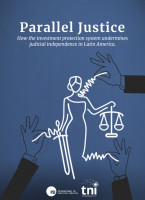
Credits
Authors
In collaboration with
- Public Services International (PSI)
- Friedrich Ebert Stiftung
Downloads
-
See Olivet, C. and Ghiotto, L. (2021) Parallel Justice: How the investment protection system undermines judicial independence in Latin America. Amsterdam: Transnational Institute (TNI) and Public Services International (PSI). https://www.tni.org/es/justicia-paralela
-
Transnational Institute (2022) ‘ISDS en América Latina y el Caribe’. Amsterdam: Transnational Institute. https://isds-americalatina.org/en-numeros/
-
CEPAL (2019) Panorama Social de América Latina, p. 146. https://repositorio.cepal.org/bitstream/handle/11362/44969/1/S1900908_es.pdf
-
For more information: http://caitisa.org
-
CIAR Global (2019, October) ‘Perú: Más de 6M$ para enfrentar la defensa en el arbitraje por Mamacocha’. https://ciarglobal.com/peru-mas-de-6m-para-enfrentar-la- defensa-en-el-arbitraje-por-mamacocha/
-
CIADI (2019) ‘Award Perenco vs. Ecuador’. https://www.italaw.com/sites/default/files/case-documents/italaw10838.pdf
-
This argument is further developed by UNCTAD (2009) The Role of International Investment Agreements in Attracting Foreign Direct Investment to Developing Countries. Geneva: UNCTAD; Hallward-Driemeier, M. (2003) ‘Do Bilateral Investment Treaties Attract FDI? Only a bit...and they could bite’, World Bank Policy Research Working Paper. Washington, DC: World Bank; Poulsen, L. (2010) ‘The importance of BITs for foreign direct investment and political risk insurance: Revisiting the Evidence’, Yearbook on International Investment Law and Policy 2009/2010. Oxford: Oxford University Press.
Publication: Newsletter banner
Did you enjoy reading this content?
Sign up for the newsletter to receive monthly updates on TNI’s research, events, and publications.
Newsletter Subscribe to our newsletter
More like this
-
Parallel Justice How the investment protection system undermines judicial independence in Latin America
Investment ProtectionPublication byPublication date:- Cecilia Olivet
- Luciana Ghiotto

-
ISDS in Nigeria Investment Regime Reforms and the threats of joining the ECT
Investment ProtectionReport byPublication date:- Bettina Müller
- Cecilia Olivet
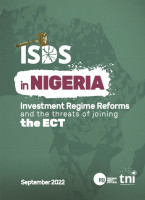
-
ISDS en números Impactos de las demandas de arbitraje de inversores contra Estados de América Latina y el Caribe
- Tratados de libre comercio (TLC)
- Protección de inversiones
Paper byPublication date:- Bettina Müller
- Luciana Ghiotto
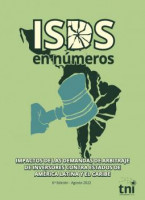
-
Impactos del sistema de protección de inversiones y arbitraje en Chile Aportes para el proceso constituyente
Protección de inversionesReport byPublication date:- Luciana Ghiotto
- Bettina Müller
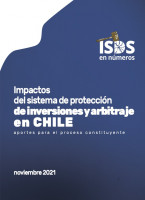
-
The Future is Public Towards Democratic Ownership of Public Services
- Democratic Public Services
- Remunicipalisation
BookPublication date:

